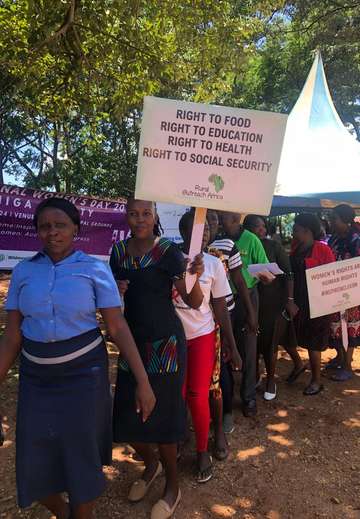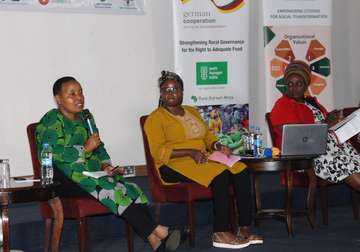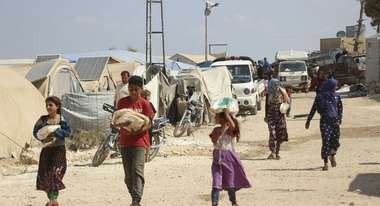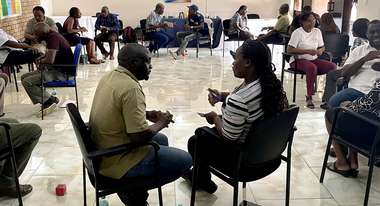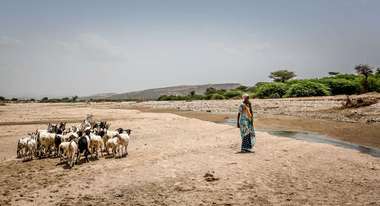The Right to Food at the Grassroots: How People Hold Their Governments Accountable
Participation in public programmes and grievance procedures should not depend on the goodwill of those in power - especially for marginalized groups.

The dramatic rise in hunger as a result of wars and crises that mutually reinforce each other often obscures a central cause of hunger: the neglect of rural areas. A programme implemented by Welthungerhilfe together with partner organizations in Kenya, Malawi, Burkina Faso and India shows how the population there can influence political decisions and demand access to public services.
The Right to Food is a fundamental human right which more than 170 countries have agreed to implement by acceding to the UN Treaty on Economic, Social and Cultural Rights. For a long time, Ibrahim Ali, a smallholder farmer from the Mangochi district in the south of Malawi, was unaware that it was even enshrined in the country’s constitution. Nor did he know that the state had thus committed itself to use its resources to ensure that all people in the country – even in remote regions – have access to sufficient and healthy food. The state must therefore create conditions so that people can either grow their own food or have sufficient income to afford a healthy diet. If people do not have these resources through no fault of their own, it is up to the state to support them.
The conditions under which Ibrahim Ali farms are difficult. His village can only be reached by a four-hour drive on a sandy track from the district capital Mangochi. In the rainy season, the bridge leading to his village is usually impassable for weeks. Children cannot get to school and pregnant women cannot reach the hospital. Even the district government's agricultural advisor rarely manages to get to Ibrahim's village. Yet advice is urgently needed. The soil on the small plots of land that the subsistence farmers in Mangochi cultivate is increasingly depleted, their harvests are threatened by drought and heavy rainfall.
Even before Cyclone Freddy completely washed away Ibrahim's harvest in 2023 – and with it the seeds for the coming year – the farmer did not have enough capital to afford seeds and fertilizer. Machinery and irrigation systems are out of the question. The sharp rise in the price of petrol, fertilizer and food as a result of the Russian war of aggression against Ukraine has made his situation even worse. The Malawian government has launched a program to support small-scale farmers like Ibrahim Ali. They are entitled to five kilograms of subsidized maize seed and 100 kilograms of fertilizer. However, it turns out that this support does not always reach those who need it most. Or seed arrives too late to sow it in time.
In Kenya, too, Naomi Amwayi from the district of Vihiga, north of Kisumo on Lake Victoria, is also dependent on state support (1). The mother of six children is barely able to work due to a disability. People with severe disabilities, orphans and senior citizens can apply for monthly social assistance of 2,000 shillings (14 euros). The amount has not been adjusted since 2013 despite high inflation rates. Although it can only cover a fraction of the cost of living, it is essential for those affected. Although Naomi was registered for the social assistance program since 2014, she received no payment until 2020. The state apparatus was an impenetrable labyrinth for her. She simply didn't know who to turn to in order to claim the support she was entitled to.
To make it easier for people like Ibrahim and Naomi to access public services, Welthungerhilfe and its partners in Kenya, Malawi, Burkina Faso and India have launched a program to improve governance in rural areas. Marginalized groups, including women, children, young people, people with disabilities and smallholder families, should be able to exercise their human right to adequate food. That is the goal. But what does that mean in concrete terms?
It was only through the educational work of the teams from Rural Outreach Africa (ROA) and The Institute for Social Accountability (TISA) that Naomi learned that sufficient and balanced nutrition is a human right and not the privilege of a select few. She is a particularly committed villager who has become an 'ambassador' for the Right to Food and has founded a group of people with disabilities who are working together to promote their cause.
ROA and TISA support the group in evaluating government programs, such as the social security program, using a Community Score Card. Do villagers know who is eligible and how to register for the program? Do they receive their payments? How regularly? Do they know who to contact with questions and problems? Does the office responsible listen to them and offer a solution?
In discussions with district administration staff in churches or community halls, this assessment is presented and problems are identified. Some can be resolved quickly, others have to be raised repeatedly with the relevant office. The team also provides support in this regard. In the case of Naomi Amwayi, the administration finally launched an investigation and dismissed an employee: He had been embezzling transfer payments for her and other affected people for years.
Overcoming Scepticism
It was a success for the team and a confirmation to those affected that it is worth raising their voices so that those responsible are held accountable. Things don’t always take a positive turn. Often, people who are already marginalized are initially reluctant to complain to government agencies for fear of becoming even more disadvantaged. Local government, too, was initially reluctant and withheld information. Both the local partners and Welthungerhilfe were met with skepticism, as cooperation had previously been seen primarily in the agricultural sector. Supporting partners from civil society and village communities in demanding more transparency and accountability from their government was a new role.
Eventually, however, the district government and administration of Vihiga realized that such cooperation contributes to the improvement of public services – and thus also to the satisfaction of the population.
In Malawi's Mangochi district, which has a population of around one million, the government has also asked Welthungerhilfe and its local partners to support it in setting up a grievance mechanism. In Ibrahim Ali's village, the smallholder families were able to ensure that the lists of recipients of discounted seed and fertilizer are now published – and that both were delivered in time for sowing.
The Community Score Card process will help the agriculture office and the Mangochi District Council to discover the real challenges of communities and improve our services with regard to the Agricultural Inputs Program,” says the responsible district commissioner, Owen Kumwenda, confirming the benefits of exchange with village communities about the government programs.
The village community has also successfully lobbied for the district to increase the number of agricultural advisors. In cooperation with them, the farmers established in field trials that they can increase their yields if they mix mineral fertilizer with animal manure, maize bran and ash. This reduces costs; and reducing the use of synthetic fertilizers protects the soil and the climate.
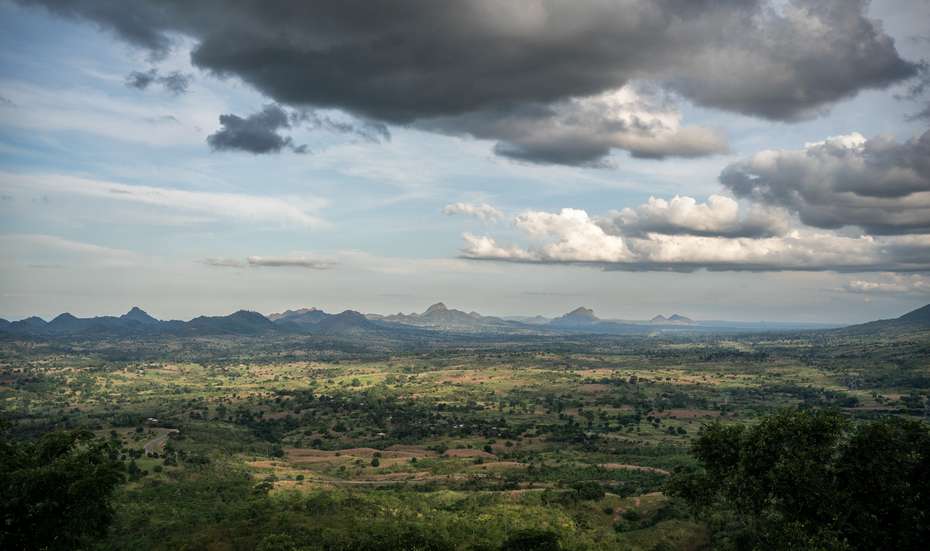
Dependent on Goodwill?
For such successes to be sustainable, the ability to influence how government invests public money and accounts for it transparently must not depend on the goodwill of the respective government representatives. Mechanisms for political participation must be established and made accessible to marginalized population groups. Citizens must have the opportunity to complain and demand redress if they are excluded from state benefits to which they are entitled.
A strong civil society is needed to implement such changes and make them known and accessible to the population. Welthungerhilfe supports civil society actors in networking and joining forces in educational, public relations and lobbying work.
In the densely populated district of Vihiga in western Kenya, the civil society Lake Region Food Systems Network has informed villagers about how they can participate in the district's development planning. They were also supported in compiling the most urgent areas for action in the district of more than 500,000 inhabitants and presenting them at a public hearing. This made it possible to include funds for climate adaptation measures, improvements to the social protection program and the inclusion of the grievance mechanism in the district's development plan. The network will now ensure that the planned funds are also invested in the implementation of these projects.
Right to Food Coalitions
"Change starts from the grassroots”, says Sheila Lyona, program officer et TISA. “But new action is also needed at national level.” This is where most decisions are made about the design of government programs. As in Malawi, the right to adequate food is enshrined in Kenya's constitution. However, in order for people to be able to exercise this right, it must be included and specified in laws, policies, institutions and programs.
Civil society partners in both countries have joined forces to form Right to Food Coalitions in order to become more effective in this regard. For example, they are campaigning for governments to keep their promise to invest at least ten percent of their budgets in agriculture – and to improve conditions for smallholder families in particular. When food prices rose to record levels in the wake of the war in Ukraine and due to high energy and fertilizer prices, through citizen protests and media work the Right to Food Coalition in Kenya contributed to the government launching an emergency programme for discounted maize meal, the most important staple food.
In the medium and long term, however, the goal must be to ensure that people at risk of hunger and poverty have a legal right to state support. Agricultural, social, health and nutrition policies must be designed so that all people can enjoy a healthy diet. To this end, the network also makes use of international instruments such as the Universal Periodic Review Mechanism of the UN Human Rights Council, which regularly reviews the human rights situation in each member state. The Right to Food Coalition will present a report on Kenya detailing where it sees a need for action in implementing the Right to Food.
The network hopes that the recommendations of the UN Human Rights Council will provide important pointers that it can refer to in its work with political decision-makers and the public on the ground. “It is our responsibility to hold our government accountable,” says Mary Karanu, who coordinates the network's work in Kenya. "Advocacy work is a marathon. It takes staying power."

Andrea Sonntag works in the policy department of Welthungerhilfe, she is program coordinator on “Strengthening Rural Governance for the Right to Adequate Food”
Footnote:
(1) Since 2013, Kenya's administration has benn decentralized with the country divided into 47 local authorities: the “counties” or districts have their own district governors and governments, district parliaments and a district administration.
